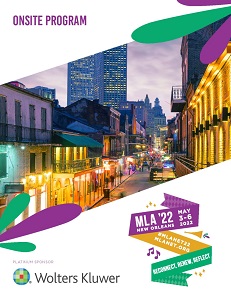Back
Lightning Talk: Program Description Abstract
Education
Session: Lightning Talk Virtual Session 2
Librarians Teaching During the Unknown: Improving Student Outcomes with Responsive Instructional Methods for Online Learning During COVID-19
Friday, April 29, 2022
2:10 PM – 2:15 PM CT

Caitlin Maloy, AHIP
School of Nursing & Research Services Librarian
University of Washington Health Sciences Library
Everett, Washington
Presenter and Author(s)
Background: My academic research institution prioritizes in-person instructional programming for health sciences students and did not have instructor training for long-term remote learning prior to COVID-19. I initially attempted to recreate the traditional classroom experience for an online environment, but this approach failed to meet student needs. My objective was to rapidly develop new remote teaching methods and materials to evolve with student and instructor feedback, with the goals of improving student outcomes and satisfaction with library resources and services, while also reducing the duplication of work by creating interdisciplinary learning materials for use by other health sciences librarians.
Description: In spring 2020 our classes moved online due to COVID-19. My instructional sessions with the School of Nursing that first quarter had low student engagement, and instructors confirmed that my online teaching methods negatively impacted student learning and outcomes. I then requested feedback by email from instructors and students for each instructional session. Using feedback and my observations, my practices evolved from a static once a quarter lecture to a series of shorter live and recorded presentations given multiple times a quarter. I designed the instructional materials to be adaptable to each health sciences school and shared them with our other librarians for their use. Follow-up discussions with instructors confirmed that by fall 2020 this program improved students’ confidence in their research skills and the quality of their work, and I found students better prepared during our individual research meetings.
Conclusion: The outcomes of these changes to my instructional methods are an increase in students' abilities to conduct literature searching and more student engagement during our sessions. I now receive more live questions and demo requests during online instruction than prior to adopting this new approach. Students appear more prepared for their one-on-one research consultations with me, and I spend less time during our meetings on the basics of navigating resources and more time with them developing their search strategies and on advanced searching skills. Additionally, these shorter presentations have been shared with my librarian colleagues and adapted to their health sciences schools, which helps to reduce our workloads involved in producing instructional materials for our service areas.
Description: In spring 2020 our classes moved online due to COVID-19. My instructional sessions with the School of Nursing that first quarter had low student engagement, and instructors confirmed that my online teaching methods negatively impacted student learning and outcomes. I then requested feedback by email from instructors and students for each instructional session. Using feedback and my observations, my practices evolved from a static once a quarter lecture to a series of shorter live and recorded presentations given multiple times a quarter. I designed the instructional materials to be adaptable to each health sciences school and shared them with our other librarians for their use. Follow-up discussions with instructors confirmed that by fall 2020 this program improved students’ confidence in their research skills and the quality of their work, and I found students better prepared during our individual research meetings.
Conclusion: The outcomes of these changes to my instructional methods are an increase in students' abilities to conduct literature searching and more student engagement during our sessions. I now receive more live questions and demo requests during online instruction than prior to adopting this new approach. Students appear more prepared for their one-on-one research consultations with me, and I spend less time during our meetings on the basics of navigating resources and more time with them developing their search strategies and on advanced searching skills. Additionally, these shorter presentations have been shared with my librarian colleagues and adapted to their health sciences schools, which helps to reduce our workloads involved in producing instructional materials for our service areas.

.png)

